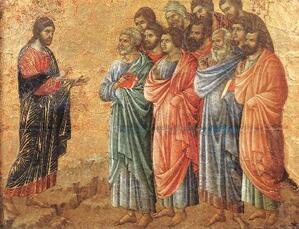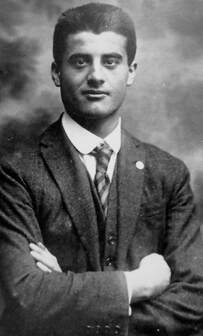 Reading is a wonderful way to learn and it is also a way to relax, depending on what it is that one is reading. When it comes to fiction, many older classics are among my favorites, although literature that is more current can be enjoyable, too. However, because of a tendency toward reflection, sometimes I find connections to spirituality, perhaps even where none were intended by the author. Recently I read such a book, a best seller which will not be named because spoiling a good book is not my intention here. Nonetheless, the basic plot sounds ordinary enough: a couple has some personal difficulty, a somewhat mysterious person comes into their lives, and through tragedies and triumphs which occur along the way, this person teaches every character in the novel a lesson of great importance. However overworked that plot line may seem, this one was cleverly written with characters that were well developed.* However much I enjoyed it, the end part of the book was disappointing at first; but after some reflection I began to see that while the mysterious person never ceased to be a mystery, that person had a profound effect upon every character in the novel by teaching each one how to love in a new way. And doesn’t that sound a bit like Jesus? He came into the world as a somewhat mysterious figure to those around Him who were trying to figure out what He meant when He said or did things which they could not truly understand. And in the end, He taught everyone how to love. The major difference between Jesus and the character in the novel is that Jesus did more than teach about love, He is love. And Jesus loves us with perfect love, a love beyond all comprehension that has no end: Love is always with us.  The main point made by the author of the novel was that love has lasting effects. All of the main characters grew in their understanding of love, an effect which was carried outward in their subsequent relationships with others. This is what Jesus taught: love begets love, and in this way Love is always with us. Similarly, all of our actions affect people around us, and so it is important to realize that we have the power to change lives for better or for worse. And of course, the effect we desire should be for the good, leading others toward love, that is, toward God, and not away. As Christians we have been taught that true discipleship is about the process of becoming more like Jesus, becoming His hands and feet, bringing His light and love to the wider world. Jesus taught this throughout His ministry, but it is driven home at the end of His sojourn on earth. The last words Jesus spoke before He ascended were these: “All power in heaven and on earth has been given to me. Go, therefore, and make disciples of all the nations, baptizing them in the name of the Father, and of the Son, and of the Holy Spirit, teaching them to observe all that I have commanded you. And behold, I am with you always, until the end of the age.” (Matthew 28:18-20) Therefore, the disciples were being told to bring love and everything love means to the entire world, a work which they would begin, and would then be continued by disciples through the ages.  The core of the gospel is love, something which often consists of challenging work. Love is about actions, difficult decisions, and commitment; it is also about kindness, leading others to goodness and hope, working for justice, and being present in every kind of situation. The source of this hope, courage, and persistence is Jesus who explains it in the first sentence of His commissioning. He said, “All power in heaven and on earth has been given to me.” (Matt 28:18) Thus, Jesus empowers His followers to have the gifts needed in order to go forth in love, to courageously persevere through the obstacles that will in fact come, as well as to be able to recognize the presence of God in the joy of new life, the result of love. But let us be clear: love does not solve all problems. Rather, love helps us to endure that which we would not be able to withstand otherwise. Love unifies people, enabling them to work as a true community; love enables us to see past differences so we can embrace diversity. Love unites and never divides; it brings us closer to God and never away from Him. But in no way did Jesus ever imply that love would be easy: love is not the easier path in life, but for those who love God, it is the only way.  An excellent example of one who chose love is Blessed Pier Giorgio Frassati, (1901-1925; feast day, July 4.) Apparently he always carried a particular passage of Scripture with him.** This is interesting because Pier Giorgio had a habit of memorizing long passages of Dante or other classic spiritual works which he could recite at any given moment. Therefore it seems logical to assume that he had this one memorized, too, making it curious as to why he would carry a written copy. My guess would be that having it with him acted as a reminder of how he wanted to live: what he carried was the great hymn about love written by St. Paul which begins, “Love is patient, love is kind….” (1 Corinthians 13) If you research his life you will see that Bl. Pier Giorgio lived this passage as well as anyone ever could. He was patient, kind, selfless, polite, caring, and was not brooding or jealous. And in his actions toward the poor, he gave away much of what he had, but never in a way that brought him attention. When he died, thousands of poor people showed up at his funeral, baffling his family as to why this would be. It seemed that those poor were there to honor their friend and the Lord he served so valiantly, even with great suffering. Bl. Pier Giorgio was not perfect; no saint ever is. But as a lay person he devoted his life to spreading the gospel in word and deed, wanting nothing more than to share the love of Jesus with everyone, including his enemies. The effect he had on people was profound, and he continues to be a role model for young adults today.  Bl. Frassati lived the commission of Jesus in the very way Jesus intended, which is through love. You could say this of all of the saints, each of whom did it in their own individual way. However, one additional mention must be made, and that is St. Thérèse of Lisieux who realized that her entire vocation was love. In other words, she aligned the core of her being to Jesus so she could be love, just as He is love. Thus, being holy is about living love in whatever unique way we have been called, in whatever unique circumstances we encounter on a daily basis. Living love is not about being perfect, but rather it is about pointing others toward Jesus so that they might enter into a deeper relationship with Him, too. We have been empowered to love as we are able though the gifts given by the Holy Spirit at Baptism and through all the subsequent sacraments. Every time we partake of the Eucharist, the Body, Blood, Soul, and Divinity of Jesus Christ, we are immersing ourselves in Love in order to know (and thus share) Him more clearly, love Him more dearly, and follow Him more nearly. *** The Eucharist is our food, our fuel, our lifeline to the One who loves us and enables us to love. It is also important to remember that sin is the enemy of love, and therefore it is imperative that we partake in the boundless mercy of Jesus offered through the Sacrament of Reconciliation. That we are not perfect is no longer an obstacle to those who partake of the graces being offered through this great Sacrament of healing. Therefore, we have nothing to fear because grace (the Holy Spirit) will give us all that we need. When Jesus said, “All power in heaven and on earth has been given to me. Go, therefore, and make disciples….,” He not only commissioned His followers, but He also made it clear how we are to accomplish this work: He is love and therefore the power He gives is the power of love which we are to share in simple, everyday ways. This power enables us, His disciples, to build the Kingdom one act of love at a time. Thus, we can be like St. Thérèse, making small acts of love a part of our lives; or we can be like Bl. Pier Giorgio Frassati, seeking the grace to carry within our hearts the love offered by Jesus and described by St. Paul so that we might bring healing, mercy, peace, and hope to a world which sorely needs it. Jesus calls us to be examples who teach with our lives that Love is always with us “to the end of the age.” (Matt 28:20)  May we be good examples of discipleship, working toward a return to selfless love! May we be inspired to live like the holy ones who sought to be as Christ to others! May we ask the intercession of Blessed Pier Giorgio Frassati and St. Thérèse of Lisieux that we might imitate Christ in whatever way we have been called! May we turn to the graces offered through the Sacraments, utilizing their power to enhance our ability to love! May we live such that others are enriched by our presence! And may we remember that God is always with us because as St. Paul says, nothing can ever separate us from His love! Let us continue to meet in the Heart of Jesus! Peace! ©Michele L. Catanese Notes: The next post will be on July 29. *If you absolutely must know what novel I am referring to, send me a private message via email and I will tell you. But be forewarned that I have not named the novel for a reason: I absolutely detest when someone ruins a story by revealing details and plot points to those who have not yet read or seen it. And even though I have been general in my descriptions, there is enough said to color how you might read this particular book rather than seeing things through your own lens. **I read an article in Aleteia written by Philip Kosloski which brought this to my attention. https://aleteia.org/2019/07/04/bl-pier-giorgio-frassati-always-carried-this-one-bible-passage-with-him/?utm_campaign=NL_en&utm_source=daily_newsletter&utm_medium=mail&utm_content=NL_en ***While many will recognize this statement, I was not quoting a song in the musical, Godspell; I was quoting St. Richard of Chichester from whom it originates. For more see https://www.oystermouthparish.com/st-richard-of-chichester Images: 1. Oregon coast, my photo: I chose this to open the entry because the overcast sky and low cloud make this beach seem like it is shrouded in mystery. 2. Appearance on the Mountain in Galilee, by Duccio Di Buoninsegna (1308-11): I chose this painting because it depicts Matthew 28:16-20. Jesus was commissioning the apostles as quoted in the paragraph. 3. My photo, taken on a hiking trail in mid New York State: This photo seems to exemplify the point that love is not always easy. Sometimes we have to watch our step carefully given that the enemy loves to trip us up or get us to head in the wrong direction. 4. Blessed Pier Giorgio Frassati: This is a rather famous photo of Bl. Pier Giorgio taken when he was in his early 20's. (He died not long afterward, at the age of 24.) 5. Photo, Eucharist at the Consecration at Mass: I chose this for two reasons; the first is that it shows the vessels that hold the elements which become the Body and Blood of Jesus at the consecration. I also chose this particular photo because the hands are those of the iconographer who wrote the icon which is follows. 6. Icon, Blessed Pier Giorgio Frassati, by Fr. William Hart McNichols: It only seemed natural to use this icon since it was commissioned by my husband and I a number of years ago. It is a favorite, naturally. If you are interested in purchasing a copy (in one of a wide variety of mediums) from Fr. Bill, go to https://fineartamerica.com/featured/blessed-pier-giorgio-frassati-197-william-hart-mcnichols.html 7. My photo, rainbow over Kaikoura, New Zealand: I chose to end with this photo because the rainbow was given as the sign of the first covenant God offered, the covenant made with Noah. A covenant is a commitment of love between God and His people. Love is the core of all covenants, and thus, Jesus is the New (and final) Covenant: He is Love and Love is always with us. NOTE: In compliance with GDPR rules, I wish to make it clear that I do not gather any information on any of my readers at any time. Comments are closed.
|
Heart Speaks to Heart
|

 RSS Feed
RSS Feed

